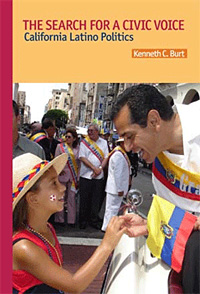
|
 |
 |
 Entertainment | Books | February 2008 Entertainment | Books | February 2008  
The Search for a Civic Voice: California Latino Politics
 Rosa Martha Villarreal - Tertulia Magazine Rosa Martha Villarreal - Tertulia Magazine
go to original


| | The Search for a Civic Voice: California Latino Politics. Kenneth C. Burt. Regina Books; $24.95; www.reginabooks.com; www.KennethBurt.com. | | |
The role of Hispanics in American politics has garnered the attention of various interlocutors now that they’ve passed African-Americans as the nation’s largest minority. As a group, Hispanics are perhaps the most complex and diverse of any “minority,” defying even national origin as a common denominator. Though Mr. Burt uses the all encompassing term “Latino” as part of his title and throughout his discourse, the book more accurately reflects the evolution of political power of Mexican Americans in California. Citizens of Mexican origin, after all, have continuously inhabited California since the Spanish Colonial period, and the Hispanic presence in California has been and continues to be predominately of Mexican origin.

Written in a lucid, non-academic style, The Search for a Civic Voice is a refreshing throwback to when histories were not only meant to be informative but dramatic and entertaining. It far exceeds its promise to be a compilation of political “firsts.” It offers a non-partisan and almost self-consciously neutral presentation of the evolution of the Hispanic electorate from 1939 to the election of Antonio Villaraigosa as Mayor of Los Angeles in 2005.

The book starts with the careers of pioneering politicians such as Eduardo Quevedo and New Mexico transplant Edward Roybal and details their talents for forming political coalitions with labor, New Deal progressives, and the Jewish electorate. However, in an ironic twist, the very economic success and social upward mobility nurtured by the Hispanic’s new political power is what ushers in the most fascinating chapter in the California landscape: the emergence of a Hispanic Republican base beginning in the 1950’s, fracturing the old coalitions, and pitting the interest of assimilated, middle-class and upper middle class Hispanics against their poorer, usually immigrant brethren.

Though Mr. Burt refrains from offering his opinion, it is not difficult for the reader to draw his/her own conclusions about the political pulse of Hispanic in California, particularly for those of us who can remember the clever fragmentation of the Hispanic electorate by Republicans and especially President Nixon. Appealing to the natural movement to conservatism based on, foremost, economic success, and secondly on traditional Hispanic (especially Mexican) family values, the Republican strategy was to peel away support away from the progressive-labor-ethnic coalitions just at the time when the strident Chicano nationalist rhetoric and ideologies were infliterating the academy and the labor movements and alienating middle-class Hispanics. Mr. Nixon, and later California Gov. Deukmejian, not only aggressively courted the affluent middle-class but rewarded successful Latinos with prominent appointments in their administrations. Increasingly, the Mexican American electorate was rewarding the Republican Party with a sizable percentage of the vote, including a full 50% who voted for Ronald Reagan in 1984.

The trend towards the permanent fragmentation of the Hispanic vote, if not the outright conversion to the Republican Party, was dramatically reversed by Gov. Pete Wilson, who had ironically won forty-five percent of the Latino vote in 1990. Facing electoral defeat in 1994, Wilson embraced Proposition 187, which, on its face value, meant to deny illegal immigrants state services. The campaign, however, soon devolved into Latino scapegoating. Opponents of Proposition 187, moreover, remained split in their strategy. The radical elements were more successful in mobilization, resulting in a march in Los Angeles 100,000 strong. However, as with the 2006 amnesty marches, many of the protesters were ineligible to vote and the sea of Mexican flags ignited a widespread public indignation that carried the state for the Republicans in 1994. However, the Hispanic electorate once again flocked to the Democratic Party and ushered that party’s current control of the state.

The story of Latino political evolution is still undetermined, especially with a sizable portion of the Hispanic vote going for Arnold Schwarzenegger in the gubernatorial election and for George W. Bush in 2000. But The Search for a Civic Voice should become a classic on 20th century Hispanic politics in California.

Rosa Martha Villarreal is a Contributing Editor to Tertulia Magazine where this article first appeared. She is the author of The Stillness of Love and Exile and Chronicles of Air and Dreams.

In the late 1700’s, rooms in the local theaters in Madrid were reserved for men of letters to engage in intellectual discussions. Since most of these men were Catholic clergy, their discussions many times revolved around the Church Father Tertullian. Thus, the tertulia was born. In 2003, Tertulia Magazine was founded by Rosa Martha Villarreal, An H. Nguyen, and Bernardo Salinas to continue the tradition of independent, non-ideological discourse through art and written word in cyberspace. | 
 | |
 |



